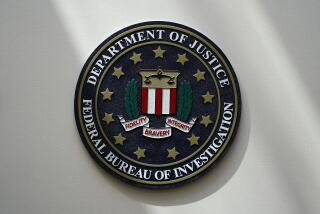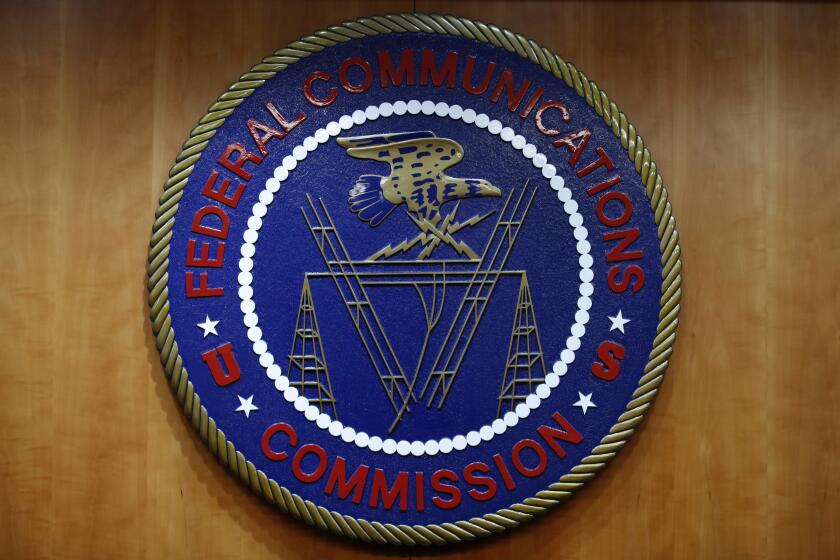Arrests made in alleged JFK plot
NEW YORK — Federal investigators on Saturday said they had disrupted a plot by Islamic extremists to blow up buildings, fuel tanks and pipelines at John F. Kennedy International Airport, another alleged plan aiming at America’s air travel system and a landmark in its largest city.
The arrests of a U.S. citizen from Guyana, which neighbors Venezuela, and two alleged accomplices on Trinidad, off the coast of Venezuela, underscored what counter-terrorism officials have described as the global spread of the terrorist threat beyond the Muslim countries in the Middle East and Asia associated with Al Qaeda and other groups.
The American, retired JFK cargo worker Russell Defreitas, 63, was charged with three other men in what officials described as a plot intended to cause mass casualties and cripple one of the world’s busiest travel hubs. Also arrested were a former member of Guyana’s parliament and a citizen of Trinidad and Tobago. Another Guyanese citizen is at large, believed to be in Trinidad, authorities said.
The scheme was so nascent, investigators said, that no plan had developed for acquiring explosives, let alone gaining access to the tanks and pipelines.
The men had gathered detailed surveillance of the airport, made repeated overseas trips and sought help from a radical Islamic organization in Trinidad, said federal officials, citing an investigation underway since January 2006.
“The devastation that would be caused had this plot succeeded is unthinkable,” said U.S. Atty. Roslynn R. Mauskopf, who represents the Eastern District of New York, at a Saturday afternoon news conference in Manhattan to announce the arrests.
Even so, officials downplayed the danger to travelers, saying that the plot was far from “operational” and that there was no intelligence to suggest an imminent threat in the U.S. “There are no adjustments to our security posture being made as a result of this plot,” said a U.S. Homeland Security official who, like others, requested anonymity while discussing the ongoing investigation.
Officials also said there was no indication of any links to the Al Qaeda terrorist network.
The main figure in the alleged plot, Defreitas, was arrested at a Brooklyn diner Friday night. The two other arrested men were said to be in custody in Trinidad.
“Defreitas was driving this,” said a U.S. federal law enforcement official familiar with the investigation. “But he was trying to hook up with some heavy-hitters who had connections for backing and financing.”
New York City Police Commissioner Raymond W. Kelly called Defreitas a “self-radicalized New Yorker” who was “plotting to betray his adopted country with a catastrophic attack.” But a federal law enforcement official said the suspect seemed more like a “sad old guy who’s got a lot of spit and vinegar in him.”
Defreitas was arraigned at a Brooklyn courthouse Saturday.
The case is the latest in a series of alleged domestic terrorist threats involving Muslims residing legally in the U.S., including a case last month at the Ft. Dix Army base in New Jersey.
And the JFK case appears to carry some of the same complications of those earlier investigations -- including the reliance on a paid FBI informant with a criminal record, and questions about some of the alleged plotters’ intentions and capabilities.
Investigators indicated Saturday that they had to move more quickly than planned when one of the primary suspects, former Guyanese lawmaker Abdul Kadir, was unexpectedly arrested in Trinidad on Friday. Kadir was described as an imam and the former mayor of Linden, Guyana, as well as a former member of parliament.
“We had to move real fast” after the Trinidadians arrested Kadir, the U.S. federal law enforcement official said. It was unclear why Trinidad authorities made the arrest, the official said, but law enforcement officials feared the arrest would prompt other suspects to flee.
Defreitas was arrested a short time later, as was Trinidadian Kareem Ibrahim.
The suspect at large is Abdel Nur of Guyana.
The United States is seeking the extradition of Kadir and Ibrahim. All four men could face life in prison if convicted.
The aim of the plot, officials said, was to cripple the United States economically and psychologically by blowing up pieces of Kennedy’s elaborate jet fuel storage and pipeline system, which stretches across several of the city’s boroughs through New Jersey to a supply point in Allentown, Pa.
JFK is among the world’s busiest airports, with about 1,000 flights a day. It is expected to handle 45 million passengers and 1.5 million tons of cargo this year.
Much of the federal case cites information obtained with the help of an FBI informant, who is not named in the complaint but is described as having been convicted of drug trafficking and criminal conspiracy. The informant’s sentence for his latest conviction “is pending as part of his cooperation agreement with the government,” according to the 33-page complaint filed Friday and unsealed Saturday.
The complaint says Defreitas had greeted the informant and a companion at a mall, saying he recognized them from a Brooklyn mosque. Defreitas and the informant met on occasions after that, and eventually Defreitas invited him into the plot, the complaint says.
The two are described as making four visits to JFK together in January to conduct surveillance and make videotapes of potential targets. The two also traveled to Guyana together, the complaint says.
The complaint alleges efforts to tap Muslim extremists from the United States, Guyana and Trinidad, including the Jamaat al Muslimeen, a group that staged a coup attempt in Trinidad and Tobago in 1990. It says the men tried to solicit money, expertise and technical help from overseas contacts.
The FBI informant recorded conversations with Defreitas, the complaint says. In one section, Defreitas is quoted as describing his desire to launch a strike that would surpass the impact of the Sept. 11 attacks, and explains that his former job gave him “unique knowledge of the airport.” In other conversations, the complaint alleges, Defreitas described being angered while working at JFK to see military parts being shipped to Israel “that he felt would be used to kill Muslims.”
Defreitas also spoke of the psychological effect on Americans of striking at JFK, the complaint says, quoting him as saying: “Anytime you hit Kennedy, it is the most hurtful thing to the United States. To hit John F. Kennedy, wow.... They love John F. Kennedy like he’s the man.... If you hit that, this whole country will be in mourning. It’s like you can kill the man twice.”
The complaint alleges that Defreitas and others gathered information on the airport by such methods as making videotapes of areas where planes were parked, and downloading satellite images from Google Earth to map the airport’s layout.
According to the complaint, Defreitas also made repeated trips to Guyana in recent months to try to enlist help from Kadir and others to carry out the attack, which the complaint said Kadir code-named “the chicken hatchery” or “chicken farm.”
Defreitas “had some ideas” about what he wanted to do, said the U.S. law enforcement official who spoke on condition of anonymity. “But he was a long way off from being operational or even coming close to getting explosives or posing a direct threat to JFK.” The official characterized the seriousness of the plot as “a notch below Ft. Dix” -- the recent case in which six Muslim men in New Jersey were charged with planning an attack on the Army base.
In the complaint, at least a dozen other people are mentioned but not named who are believed to have been connected to the plot or in contact overseas with Defreitas. They are being sought for questioning, officials said.
“We had hopes to get a lot more people, but they are still at large,” the U.S. law enforcement official said. “They’re not charged, but they are still involved.”
Defreitas had been an employee of Evergreen Service Co. at JFK, Kelly said. Company officials did not respond to requests for comment.
The neighborhood where Defreitas was last known to live is a community of red brick row houses in East New York, populated largely by African Americans, Latinos and West Indian immigrants.
Two residents said a man fitting Defreitas’ description often hung out at the herbal store, sometimes playing drums. In the last week, that man and several others, all wearing long gowns, performed some kind of ritual with incense outside the store, they said.
Jasmine Jeter, 26, said the man seemed to fit in with the local Guyanese population. “He seemed really quiet and kept to himself,” said Jeter, who lives a block away and said she was shaken to hear of the arrest.
erika.hayasaki@latimes.com
---
Miller reported from Washington and Hayasaki from New York. Times staff writers Josh Meyer in Washington and Matea Gold in New York contributed to this report.
(BEGIN TEXT OF INFOBOX)
Recently alleged plots
May 8, 2007: Six suspected Islamic radicals are accused of plotting to attack the U.S. Army base at Ft. Dix, N.J., with rocket-propelled grenades and automatic weapons. They are not believed to have links to any foreign organizations.
July 7, 2006: U.S. authorities, working with six foreign intelligence agencies, say they’ve cracked a planned suicide attack on the rail system linking Manhattan and New Jersey under the Hudson River.
June 23, 2006: Seven men are charged with conspiring to blow up Chicago’s Sears Tower and the FBI building in Miami. They are accused of pledging loyalty to Al Qaeda.
Source: Reuters
More to Read
Sign up for Essential California
The most important California stories and recommendations in your inbox every morning.
You may occasionally receive promotional content from the Los Angeles Times.









